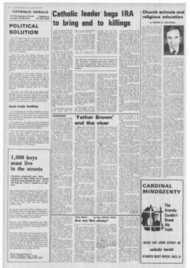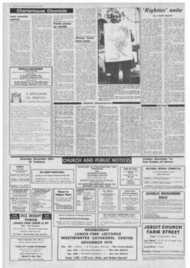Page 8, 29th November 1974
Page 8

Report an error
Noticed an error on this page?If you've noticed an error in this article please click here to report it.
Tags
Share
Related articles
Discoverer Of Anne Frank's Diary Makes Exhibition Trip To...
Discovering The Delights Of The Irish Deep South, The...
Court Pomp And Circumstance
Charterhouse Chronicle
Joint worship centres
Champagne corks were popping this week at a reception in London held by Peterborough Development Corporation. It was to announce an exhibition charting achievements in the town's five-year-old expansion programme which will soon bring the population to 100,000.
Three new townships are being created within the area of Greater Peterborough and one of them, Orton, is to be the scene of possibly the most extensive ecumenical effort yet attempted in Britain. Five denominations have agreed to share worship centres and pool their facilities for the 23,000 people who begin moving in next year,
Anglicans, Catholics, Baptists, Methodists and the United Reform Church will jointly contrihute money and manpower to provide a far more comprehensive presence in the new township than any denomination could afford individually.
The scheme has evolved with the close co-operation of Peter
borough Development Corporation, the City Council and Cambridgeshire County Council. Mr David Mackay, Peterborough's Assistant Social Development Officer, has been responsible for liaison and he spoke enthusiastically of what will be called "The Church of Orton".
Mr Mackay, clearly well informed about denominational needs, said that the ecumenical movement in Orton began by deciding what aspects of Church life could be shared and what must remain separate. This led to the plan for "worship centres" with partition walls which could be removed for certain joint services, as well as meetings and other social activities.
Once denominational needs had been catered for, the Churches agreed to give priority to common areas of work. This would result in a "community care" team to help the sick, the aged, the young and people with problems.
Mr Mackay admitted that there had been one or two "local problems" in setting up the scheme, but these had now been overcome. As he rightly
said, this ecumenical experiment had come about through putting people and not buildings first.
Parish priests on wheels
According to the report of his diocesan synod in last week's Church Times, the Anglican Bishop of Derby, the Rt Rev. C. W. J. Bowles, thinks that the increase in petrol prices may not altogether be a bad thing as far as clergymen are concerned.
It may well mean that they will have to take much more "to their feet. to bicycles or even to horseback." Bishop Bowles feels that all this "may mean a much better parochial ministry."
While not necessarily subscribing to all that, the benefits of simpler travel have long been enjoyed by two Crosby parish priests — Canon Francis Danhcr and Dean Robert Flynn. Neither is in the first flush of youth. being 65 and 69 years old respectively, but each can be seen daily cycling round their parishes on Merseyside.
Dean Flynn says that he has been riding since 1934. "My first bike was provided by my parish," he says. "I've had this particular one for ten or twelve years now."
Canon Danher started riding as a boy and has never given up. "It's the only way to travel," he says. "I find it is a lot more efficient when I'm doing pastoral work."
Dean Flynn comments that he can stop whenever he wants to and talk to parishioners. "Everyone waves to me," he says.
These two Liverpool cycling priests remind me of the late Canon Tom Phelan of St Patrick's, Grangetown, Cardiff. He stuck to his bike, and with his leather mac of a vintage as old as the bike and almost as old as himself, was around visiting the old and the sick, sometimes seeing as many as 40 couples in a day. He was doing that right up to a day or two before his death — and he was over 80.
Is the bike going to be the symbol and the means of longevity among the clergy? Will it help to solve the shortage of priests by extending their active lives? Who knows — a special cycling proficiency course for clergymen (interdenominational, of course) may well become part of their training, and a new bike as the first gift at ordination and jubilees!
African 'home from home'
It's encouraging to see that the Africa Centre in London's Covent Garden has been celebrating a "tenth anniversary week" which ends tomorrow. The junketings have included snake-charmers, storytellers, poetry readings, art exhibitions and a forum on food and population in Africa.
The centre was opened by President Kaunda of Zambia in 1964 and it has a specially close connection with the Catholic Church in Britain. It evolved from a committee of specialists on Africa brought together by Margaret Feeny of the Catholic Institute for International Relations, in response to a papal encyclical on Africa.
Until recently the centre acted as headquarters for both the CIIR and the Justice and Peace Commission. Mgr John Coonan, National Director of the Pontifical Mission Aid Societies, is now on the council of management.
The centre is first and foremost a meeting place and discussion forum, and between 1972 and 1973 an estimated 25,000 people made use of the facilities. Among the more popular activities are monthly "national evenings" which normally start with dancing or music and a meal consisting of national dishes.
blog comments powered by Disqus









